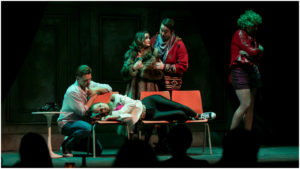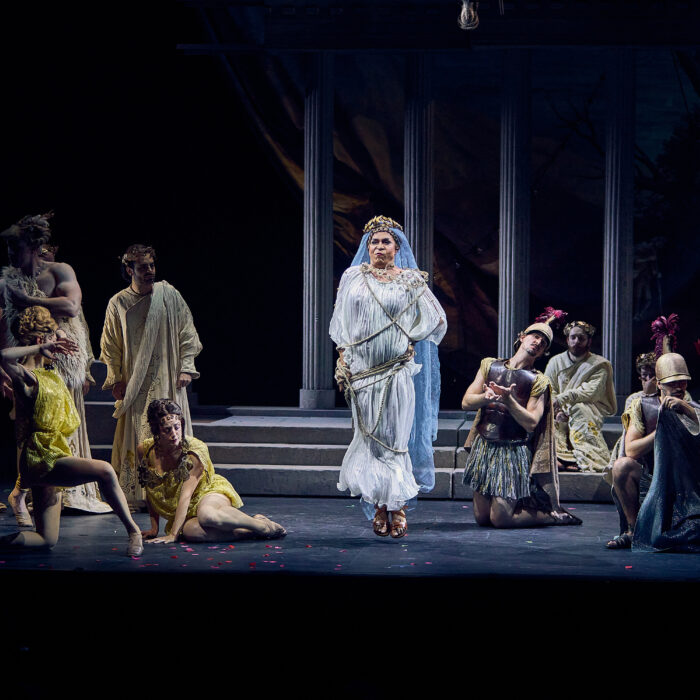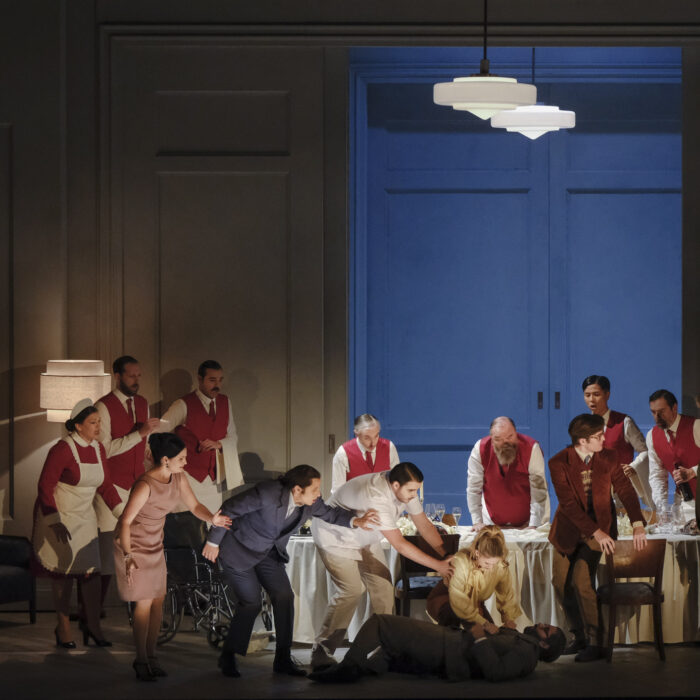
Mercury Opera 2020 Review: La Boheme
Glenn Seven Allen & Kate Fruchterman Headline Modern Touch to Timeless Classic
By Logan MartellOn March 14, 2020, Mercury Opera concluded its run of Puccini’s timeless “La Boheme.” Due to the situation regarding the spread of COVID-19, this production was offered up via live stream; this review is the result of that viewing experience.
This production translated the drama into the relatively-modern setting of New York City in 1979, in a time when the community struggled with poverty, drug use, and the advent of the AIDS crisis.
More Modern Touch
Of this concept, producer and director Darcia Parada says: “Before ‘RENT’ the musical appeared, I’d always had a desire to stage a more contemporary version of ‘La Boheme.’ While not as antiquated as Puccini’s original, this interpretation is absolutely vintage… My first NYC abode in the early mid 80s was in Little Ukraine, between 2nd and 1st Avenues on the 11th Street… It was a frightening time and it was also an exciting and creatively fertile time, when artists could still afford to live in Manhattan. Rents were relatively cheap, for like its starving artists, NYC was broke.”
While the set itself was minimal, the performance utilized the surrounding tables and stools of the venue to organically establish a barroom atmosphere as the actors moved about the audience. This effect was made all the more tangible by the presence of the keyboard, played by assistant conductor Spencer Kryzanowski, to bolster the reduced orchestra.
Adding for some modern flair, each act was opened by a contemporary song to set the mood, such as the tenderly-phrased rendition of “Danny Boy” in Act one which saw Rodolfo and Marcello casually drink in a bar.
A humorous instance of this came in opening Act two, where the song “Silent Night” accompanies a short scene of a burglar dressed as Santa Claus helping himself to what little possessions the Bohemians had in their apartment.
Highs and Lows
As Rodolfo, Glenn Seven Allen deftly conveyed the highs and lows of the poet’s abundant passion. After lighting Mimi’s candle in their initial encounter, his line of parting, “buona sera,” was charmingly contrasted by Allen’s beckoning delivery. This quality carried nicely into the opening section of his aria “Che gelida manina,” where he visualized and shared his inner world with Mimi; his conversational phrasing took on a more fluid approach as his lines swelled with emotion. Allan showed great vocal flexibility not just in the way he flowed into the climactic high C, but how he gently brought the number to a clear and delicate close.
His entrance in Act three saw Allen use a harsher sentiment as he pretended not to care for Mimi. When questioned further by Marcello, his reply of “Ebbene, no, non lo son,” was given with a bite that spoke to just how much Rodolfo was fighting with himself over his feelings. This intensity finally melted away when he discovered the hiding Mimi, his expression softening with surprise.
In the role of Mimì, Kate Fruchterman was consistently endearing. Her entrance in act 1 saw her enter hurriedly, as if she had been leaning against the door when Rodolfo opened it. Her initial bout of illness saw her quickly drop to the ground, giving Rodolfo a moment to admire her; while the direction itself was executed well, the casualness with which they continued seemed out of place for the severity of the moment. Over the course of her Act one aria “Si, mi chiamano Mimi,” Fruchterman displayed a demure bearing which was belied by her lovely, bolder vocal approach. Her second pass through the lyrics saw her rise and cross the stage as she is swept up in her own passion.
In Act three, Fruchterman navigated Mimi’s conflicted heart while reigning herself in physically, her anguished lines working well with Marcello’s firmer practicality. Her aria “Donde lieta usci,” was delivered with a touching delicacy, with the scarce orchestral texture highlighting her sense of vulnerability as she readied to leave Rodolfo’s life.
More Bohemians
In the role of Marcello, Edward Cleary nicely conveyed the painter’s changing energy through his time onstage. Through act 1 he carried most of the humor, such as their brief encounter with their landlord, and when he fell down the stairs carrying the painting he had been working on earlier. In act 2, Cleary demonstrated a fine bitterness to tinge his phrases before and during his interactions with Musetta.
Stacy Dove’s Musetta made a showy, yet seamless entrance as she grabbed the Bohemians’ attention, then took her place at one of the tables in the audience with Alcindoro. Her rendition of “Quando m’en vo” saw her, fittingly, take center stage as she matched her sensual gestures with a similar lyricism.
While her reunion with Marcello initially kept them at a distance through the measure of his passionate crescendo, they made a charming exit as he carried her on his back while the cast fled the restaurant bill.
As Schaunard, Ian Fundytus explored the role in an unconventional angle, with the musician also being a drag performer. While he employed falsetto in his entrance, his story of poisoning his employer’s parrot took on a meatier vocal quality as it reached its punch-line. Replacing the opening choral sections of the second act was a performance of Fundytus’ Schaunard, singing “Santa Baby” in a bar; this holiday favorite given humorous nuance due to the burglary incident shown moments earlier. Fundytus also spiced up his rendition with a lusty grit in his voice that worked well with the jazzy accompaniment.
As Colline, Roland Burks’ warm bass lent itself nicely to the group of friends. While the character’s presence felt reduced due to certain cuts in the work, his act 4 aria “Vecchia zimarra senti” provided a moment of poignant reflection as he brought it to a breathier close, as if nearing the verge of tears.
The setting for the events off Act four was changed from the Bohemians’ loft to a hospital waiting room, with Rodolfo and company receiving a phone call from Musetta as they frolicked in the bar amongst the audience. While the stage was set only with a few chairs lined in a row, there was no lack of tenderness from the cast as they gathered to support the dying Mimi.
Mercury Opera’s production of “La Bohème” took the work in an inventive direction, while keeping nearly all of what makes this opera so touching. While there were technical limitations to the livestream which prevented me from enjoying the performance to its fullest, the cast and crew nonetheless staged a heartfelt endeavor as they brought their run to a close.



